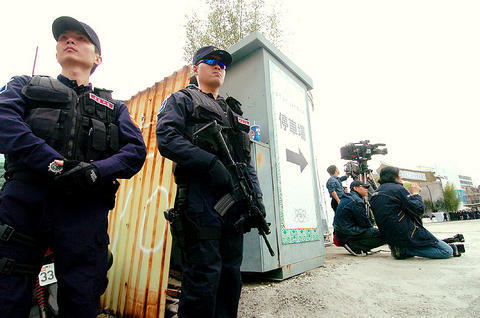More than 1,000 police officers were yesterday stationed at the temporary funeral hall for former Bamboo Union gang leader Chen Chi-li (
Chen, who turned the Bamboo Union into one of Taiwan's largest gangs, died of pancreatic cancer in Hong Kong on Oct. 4. He was 64. His body was delivered back to Taiwan from Hong Kong yesterday and arrived at the temporary funeral services site around 2pm.
In addition to the police officers, at least another 500 people, including Bamboo Union members, Chen's friends and family members gathered at the shrine to greet Chen's casket.

PHOTO: CHIEN JUNG-FONG, TAIPEI TIMES
Local television broadcast live coverage of the plane carrying Chen's body, with his family, friends and some 100 reported gang members landing at around noon.
"We want to make sure that gang members do not take advantage of the opportunity to promote gang activity or recruit new members," said Kao Cheng-sheng (高政昇), deputy commissioner for the Criminal Investigation Bureau.
Wu Dun (吳敦), a former Bamboo Union member and a good friend of Chen's, said that the final date for Chen's funeral service has yet to be decided, but should be sometime early next month.
The Bamboo Union was established in 1957.
For decades the gang remained Taiwan's most powerful gang, comprising mainly people who fled China's civil war in 1949. It later backed the Chinese Nationalist Party (KMT) government in their suppression of political dissidents.
Chen, wanted in Taiwan for organized crime, had been living in self-imposed exile in Cambodia since 1996. In August he was hospitalized in Hong Kong after his health declined.
The gang boss is best known for his involvement in the October 1984 shooting death of an author of an unflattering biography of president Chiang Ching-kuo.
Chen and several fellow gang members flew to San Francisco and gunned down Taiwanese-American writer Henry Liu (劉宜良), better known by his pen-name Jiang Nan (江南), at his home in the suburb of Daly City.
Liu's widow, Tsui Ron-chi (
"Chen Chi-li was sacrificed for our patriotic struggle," she said. "The murder gave Taiwanese dissidents an unprecedented chance" to win over support for their democratic campaign," she said.
Chen was nabbed in Taiwan one month later during a crackdown on organized crime.
At the trial, he said that the murder was ordered by a Taiwanese intelligence unit chief who claimed Liu spied for Taiwan, China and the US.
Chen and an accomplice in the killing were both sentenced to life in prison after Taiwan rejected a US demand to extradite the two for trial there.
Chen served six years in a Taiwanese jail before being paroled. Three senior intelligence officials were also jailed.
He later fled to Cambodia during another government crackdown on organized crime.
Chen is survived by his wife Chen Yi-fan (

Several Chinese Nationalist Party (KMT) officials including Chairman Eric Chu (朱立倫) are to be summoned for questioning and then transferred to prosecutors for holding an illegal assembly in Taipei last night, the Taipei Police said today. Chu and two others hosted an illegal assembly and are to be requested to explain their actions, the Taipei City Police Department's Zhongzheng (中正) First Precinct said, referring to a protest held after Huang Lu Chin-ju (黃呂錦茹), KMT Taipei's chapter director, and several other KMT staffers were questioned for alleged signature forgery in recall petitions against Democratic Progressive Party (DPP) legislators. Taipei prosecutors had filed

Taiwan would welcome the return of Honduras as a diplomatic ally if its next president decides to make such a move, Minister of Foreign Affairs Lin Chia-lung (林佳龍) said yesterday. “Of course, we would welcome Honduras if they want to restore diplomatic ties with Taiwan after their elections,” Lin said at a meeting of the legislature’s Foreign Affairs and National Defense Committee, when asked to comment on statements made by two of the three Honduran presidential candidates during the presidential campaign in the Central American country. Taiwan is paying close attention to the region as a whole in the wake of a

President William Lai (賴清德) has appointed former vice president Chen Chien-jen (陳建仁) to attend the late Pope Francis’ funeral at the Vatican City on Saturday on his behalf, the Ministry of Foreign Affairs said today. The Holy See announced Francis’ funeral would take place on Saturday at 10am in St Peter’s Square. The ministry expressed condolences over Francis’ passing and said that Chen would represent Taiwan at the funeral and offer condolences in person. Taiwan and the Vatican have a long-standing and close diplomatic relationship, the ministry said. Both sides agreed to have Chen represent Taiwan at the funeral, given his Catholic identity and

NEW WORLD: Taiwan is pursuing innovative approaches to international relations through economics, trade and values-based diplomacy, the foreign minister said Taiwan would implement a “three-chain strategy” that promotes democratic values in response to US tariffs, Minister of Foreign Affairs Lin Chia-lung (林佳龍) said. Taiwan would aim to create a “global democratic value chain,” seek to capitalize on its position within the first island chain and promote a “non-red supply chain,” Lin was quoted as saying in the ministry’s written report to the Legislative Yuan submitted ahead of the legislature’s Foreign Affairs and National Defense Committee meeting slated for today. The Ministry would also uphold a spirit of mutual beneficial collaboration, maintaining close communication and consultations with Washington to show that Taiwan-US cooperation